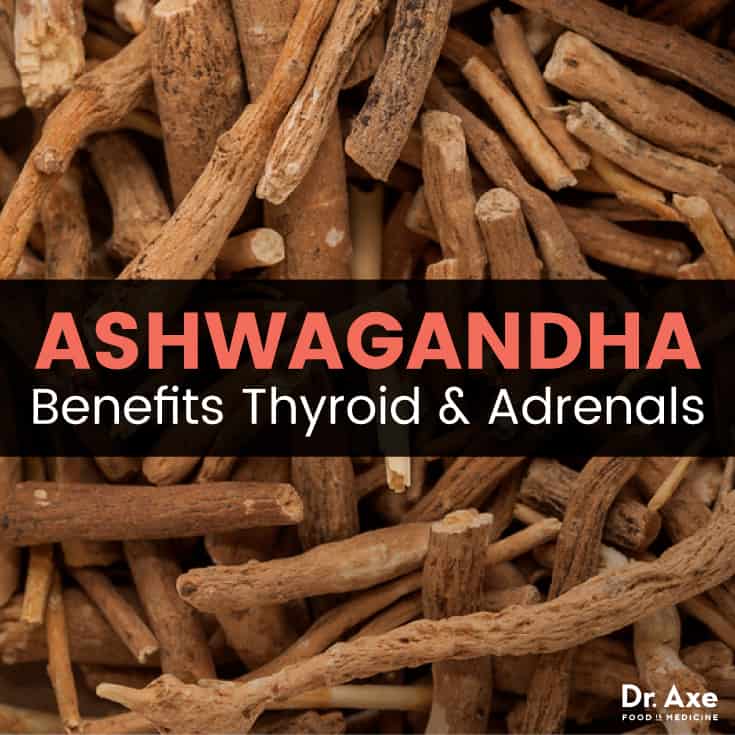
If you are looking to restore your energy, look younger, and reverse disease then ashwagandha may be the herb you’re looking for. As you’re about to see, ashwagandha benefits are impressive.
Ashwagandha, is an adaptogenic herb popular in Ayurvedic medicine that has shown incredible results for lowering cortisol and balancing thyroid hormones.
In India, ashwagandha is known as the “strength of the stallion” since it has traditionally been used to strengthen the immune system after illness.
Ashwagandha has also been referred to as Indian ginseng because of its ability to enhance stamina and has extraordinary stress relieving properties.
There have been over 200 studies on Ashwagandha’s ability to:
- Reduce anxiety and depression
- Combat effects of stress
- Increase stamina and endurance
- Prevent and treat cancer
- Reduce brain cell degeneration
- Stabilize blood sugar
- Lower cholesterol
- Boost immunity
In this article I’m going to discuss the benefits of ashwagandha in healing your thyroid, adrenal glands, improving mood and energy, preventing cancer, and supporting brain health.
Ashwagandha Thyroid Benefits
Ashwagandha is a superstar when it comes to improving the health of your thyroid. Scientists don’t completely understand how adaptogens work, but we know that they can be extremely effective especially at balancing hormones.
One of the most incredible aspects about adaptogenic herbs like ashwagandha is that it can help people with both hypo and hyper thyroid issues. It has been shown to support a sluggish thyroid for people diagnosed with Hashimotos, and has been shown to improve the health of those with an overactive thyroid or Graves disease.
Adaptogenic herbs work with your body to bring you back into balance whether your levels are high or low.
Animal studies reveal ashwagandha has a thyroid hormone balancing effect. In a 20 days study mice were give ashwagandha and their T3 and T4 levels were analyzed along with lipid peroxidation (anti-oxidant protection). Significant increases in serum T4 were found which indicates this herb has a stimulatory effect on a sluggish thyroid.
Also, ashwagandha may benefit thyroid function because it greatly reduced lipid peroxidation by promoting scavenging of free radicals that cause cellular damage. These results prove ashwagandha can be useful in treating hypothyroidism.
There are currently millions of people who struggle with thyroid problems (many who don’t even know it) and ashwagandha may just be the solution they are searching for.
Ashwagandha Adrenal Rejuvenation
Ashwagandha has also been proven effective in supporting adrenal function helping you overcome adrenal fatigue and chronic stress.
Your adrenal glands are endocrine glands that are responsible for releasing hormones (cortisol and adrenaline) in response to stress on your body.
If your adrenals are overtaxed due to an overabundance of emotional, physical and mental stress, it can lead to a condition known as adrenal fatigue. As you can see from this chart below, if your adrenals become exhausted it can also disrupt your other hormones, including progesterone, which can cause infertility and lower DHEA — which can cause you to age faster.

Medical studies have shown that ashwagandha improves cortisol levels, improves insulin sensitivity and naturally balances hormones. A case study reported a case of a 57-year-old woman with non-classical adrenal hyperplasia. She was treated with ashwagandha for six months, and after her treatment she saw improvements in four adrenal hormone markers, including corticoosterone and 11-deoxycortisol, which decreased by 69 percent and 55 percent respectively — a major improvement!
This hormonal improvement was also accompanied by a noticeable reduction in hair loss.
Benefits Brain Health
Emotional, physical, and chemical stress can all have damaging effects to the brain and nervous system. Recent research has proven ashwagandha is more than a stress reliever, it also protects the brain from degeneration and improves symptoms of alzheimer’s, depression, and anxiety.
One of the main reasons ashwagandha is so effective at healing the brain has to do with its powerful antioxidants that destroy free radicals that cause aging. A study published in Phytotherapy Research explains these benefits:
“Several studies have revealed that natural antioxidants, such as vitamin E, vitamin C and beta-carotene, may help in scavenging free radicals generated during the initiation and progression of this [Alzheimer’s] disease. But we found Ashwagandha afforded lipid peroxidation inhibitory effects more potent than commercial antioxidants.”
Researchers at the National Brain Research Centre found that mice with Alzheimer’s were unable to retain what they learned, but after 20 days of supplementing with ashwagandha, this improved significantly. The results of the study found a reduction in amyloid plaques (these cause degradation of the brain).
Improves Mood
There is also now evidence that ashwagandha is effective at treating both anxiety and depression. In fact, in a recent study its results were comparable to common pharmaceutical drugs lorazepam and imipramine without the side effects.
In the 12-week controlled study, 87 participants with anxiety were given 300mg of ashwagandha two times a day or two placebo pills two times per day. The group treated with ashwagandha resulted in much greater improvements in anxiety as well as focus, reduced stress, and decreased fatigue than the placebo group.
The other major benefit of ashwagandha is that there are no adverse reactions by taking it compared to anti-depressant and anti-anxiety medications which can have terrible side effects.
Helps Prevent and Treat Cancer
Ashwagandha extract has been shown in studies to have very promising benefits when it comes to helping with preventing and treating cancer. In certain studies, researchers have found that ashwagandha extract has a powerful anti-tumor effect. (1)
The extract has been shown to help inhibit the proliferation of cancer cells – specifically breast, lung, stomach, and colon cancer cells which are among some of the leading types of cancers in the world. It’s believed that ashwagandha helps to prevent the growth of cancer cells mostly due to its immune boosting and antioxidant abilities. Supplementing with ashwagandha is correlated with an increase in white blood cells within the body, which indicate that the immune system is better able to protect the body from disease and harmful invaders (2). Another way that ashwagnadha helps prevent cancer is due to its ability to stop blood vessels around cancer cells from feeding into the growth of cancerous tumors.
In addition to preventing cancer cells from growing, studies have shown that ashwagandha can be a very useful addition to chemotherapy in treating existing cancer. Taking the extract seems to be effective in halting the immune system from becoming suppressed during chemotherapy.
Ashawagandha is able to counteract one of the biggest concerns with chemotherapy- the count of white blood cells in the body becoming lowered, which puts cancer patients as much higher risk for things like infection. Many cancer experts are now recommending ashwagandha extract be both a cancer prevention method as well as an addition to typical cancer treatments. In fact some studies have shown that some patients are even able to reverse signs of cancer using ashwagandha alone over other standard treatment methods (3).
Increases Stamina and Endurance
Studies have shown that ahswagandha can boost endurance during physical activity by sharpening brain function and reducing bodily pain. Due to its positive calming, yet energizing, effects on the brain and ability to lower stress hormones, ashwaganha showed improvements in concentration, motivation, and stamina in conducted studies.
One particular study found that when lab rats were given ashwagandha, they actually were able to swim twice as long compared to the same type of rats that were not given the supplements (4). Researchers believe that similar effects take place in humans due to the extract’s ability to balance adrenal hormones that are involved in physical activity. The extract was also shown to reduce bodily pain in the muscles and joints while at the same time keeping energy levels more steady, which is another reason why it could be a promising supplement for athletes, or for those who find it difficult to be physically active due to pain.
Ashwagandha Dosage
As you can see, ashwagandha is an adaptogenic superstar that can have some tremendous health benefits. I recommend supplementing with 500mg 1-2x daily along with following a diet high in healthy fats, protein, and fiber as well as removing grains and sugars from your diet.
These dietary changes along with supplementing with ashwagandha can help you see great results in aging slower, reducing stress, balancing hormones, boosting energy, and improving neurological health.
References
Puri, Harbans Singh. Rasayana: ayurvedic herbs for longevity and rejuvenation – Volume 2 of Traditional herbal medicines for modern times. s.l.: CRC Press, 2002. ISBN 0415284899, 9780415284899.
Panda S, Kar A. Withania somnifera and Bauhinia purpurea in the regulation of circulating thyroid hormone concentrations in female mice. Journal Ethnopharmacology 1999, 67(2):233-9.
Panda S, Kar A. Changes in thyroid hormone concentrations after administration of ashwaganda root extract to adult male mice. Journal of Pharmacology 1998, 50:1065-1068.
Kalani A, Bahtiyar G, Sacerdote A. Ashwagandha root in the treatment of non-classical adrenal hyperplasia. British Medical Journal Case Reports 2012, 10(1136).
Gupta SK, Dua A, Vohra BP. Withania somnifera (Ashwagandha) attenuates antioxidant defense in aged spinal cord and inhibits copper induced lipid peroxidation and protein oxidative modifications. Drug Metabolism Drug Interactions. 2003;19(3):211-22
Jayaprakasam B, Padmanabhan K, Nair MG. Withanamides in Withania somnifera fruit protect PC-12 cells from beta-amyloid responsible for Alzheimer’s disease. Phytotherapy Research. 2010, 24(6):859-63
Cooley K, Szczurko O, Mills Edward, Bernhardt B, Seely D (2009). Naturopathic Care for Anxiety. www.plosone.org
From the sound of it, you might think leaky gut only affects the digestive system, but in reality it can affect more. Because Leaky Gut is so common, and such an enigma, I’m offering a free webinar on all things leaky gut. Click here to learn more about the webinar.

Original article and pictures take draxe.com site
Комментариев нет:
Отправить комментарий